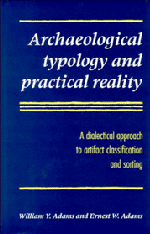 Archaeological Typology and Practical Reality
Archaeological Typology and Practical Reality Book contents
- Frontmatter
- Contents
- List of figures
- List of tables
- The archaeologist's preface
- The philosopher's preface
- PART I Introductory
- PART II The nature of types and typologies
- 3 Dimensions and elements of “typehood”
- 4 Perceptual and conceptual foundations
- 5 The dialectics of type formulation
- 6 The nature of types
- 7 The structure of typologies
- 8 A synthetic definition of typology and type
- PART III Typology in action: the Medieval Nubian Pottery Typology
- PART IV Pragmatics of archaeological typology
- PART V Classification, explanation, and theory
- Appendices
- References
- Index
5 - The dialectics of type formulation
Published online by Cambridge University Press: 23 November 2009
- Frontmatter
- Contents
- List of figures
- List of tables
- The archaeologist's preface
- The philosopher's preface
- PART I Introductory
- PART II The nature of types and typologies
- 3 Dimensions and elements of “typehood”
- 4 Perceptual and conceptual foundations
- 5 The dialectics of type formulation
- 6 The nature of types
- 7 The structure of typologies
- 8 A synthetic definition of typology and type
- PART III Typology in action: the Medieval Nubian Pottery Typology
- PART IV Pragmatics of archaeological typology
- PART V Classification, explanation, and theory
- Appendices
- References
- Index
Summary
In the last two chapters we were concerned mainly with establishing definitions, and we discussed types in more or less abstract and theoretical terms. Here we will adopt a more practical perspective, and will explore the actual processes of human thought and activity through which types come into being, or are formulated. We will suggest that the formulation of any type involves a continual feedback, or dialectic, between its physical, mental, and communicative aspects, which we discussed in Chapter 4. At least in open typologies, types evolve through use and experience like the words in any other language (cf. especially Smoke 1932; Vygotsky 1962: 124–30). (In Chapter 18 we will define an open typology as one that is designed to accommodate new finds as well as material already in hand. The great majority of practical typologies are of this kind.) We will also suggest that, like the words in any language, the use and meaning of types has to be learned, and the type labels, identities, and meanings have to be learned independently of one another (cf. Margolis 1987: 48–9).
Ferdinand de Saussure (1966) was the first to recognize that language involves the two aspects which he called langue and parole. The approximate English equivalents are “language” and “speech,” but the conceptual distinction is more clear-cut in French. Langue is the cognitive aspect of language: the set of names, rules, and meanings that each of us carries in his head.
- Type
- Chapter
- Information
- Archaeological Typology and Practical RealityA Dialectical Approach to Artifact Classification and Sorting, pp. 50 - 62Publisher: Cambridge University PressPrint publication year: 1991


